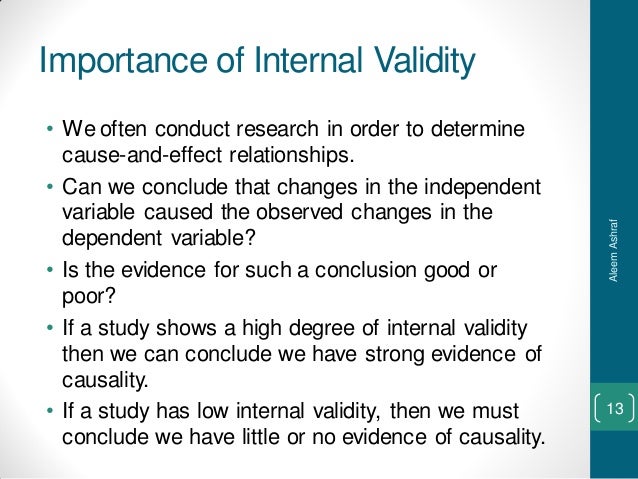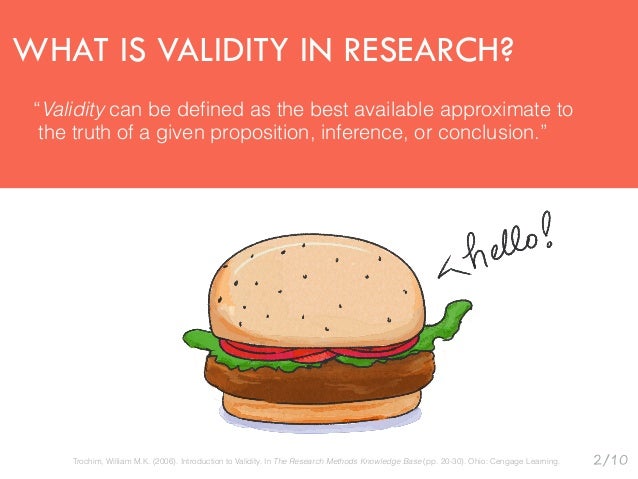If theare accurate according to the situation, explanation, and prediction of the researcher, then the research is valid. Validity refers to the accuracy of the measurement.
If research has high validity, that means it producesthat correspond to real properties, characteristics, and variations in the physical or social world. High reliability is one indicator that a measurement is valid. If a method is not reliable, it probably isn’t valid. The first thing we have to ask is: “validity of what?
When we think about validity in research, most of us think about research components. We might say that a measure is a valid one, or that a valid sample was drawn, or that the design had strong validity. But all of those statements are. For example, there must have been randomization of the sample groups and appropriate care and diligence shown in the allocation of controls.
It is a general validity measure for the common people. Face validity is not an authentic way to check the validity of the research.

Nomological Network – representation of the constructs of interest in a study, their observable manifestations, and the interrelationships among and between these. Types of validity in research. It should also be noted that the questions on the scale should cover all the objectives of the study.
While rigorous research methods can ensure internal validity, external validity, on the other han may be limited by these methods. Another term called transferability relates to external validity and refers to a qualitative research design. Depending on their philosophical perspectives, some qualitative researchers reject the framework of validity that is commonly accepted in more quantitative research in the social sciences.
Research Methodology states that to establish the validity in research, the researcher should use logic and statistical evidence. Construct validity is the most difficult type of validity to establish. It is the degree to which an assessment measures a non-observable trait such as intelligence.

Dealing with different types of validity is what makes establishing validity in qualitative research very difficult. In Quantitative research, reliability refers to consistency of certain measurements, and validity – to whether these measurements “measure what they are supposed to measure”. Things are slightly different, however, in Qualitative research.
Although the research has been interpreted and condense participants should still recognize theas authentic an at this stage, may even be able to refine the researcher’s understanding. In qualitative research, the researcher cannot adopt an objective manner and hence he is unable to prove the validity by using statistical procedures.
He can adopt some methodological techniques to develop and ensure validity in the research. He needs to make sure that he has avoided personal biases to a minimum to establish the validity of the.

Internal validity is the extent to which a study establishes a trustworthy cause-and-effect relationship between a treatment and an outcome. Internal validity also reflects that a given study makes it possible to eliminate alternative explanations for a finding. In quantitative research, this is achieved through measurement of the validity and reliability. For example, a survey designed to explore depression but which actually measures anxiety would not be considered valid.
The second measure of quality in a quantitative study is reliability, or the. Research methodology provides us the principles for organizing, planning, designing and conducting a good research. External validity refers to the extent to which theof a study can be generalized to other settings (ecological validity ), other people (population validity ) and over time (historical validity ). External validity can be improved by setting experiments in a more natural setting and using random sampling to select participants.
This study is a review. In fact, validity and reliability have different meanings with different implications for researchers. Contrast that with reliability, which means consistentover time. Ask yourself, "Am I measuring what I think I am measuring?
A distinction between primary and secondary validity criteria in qualitative research is made with credibility, authenticity, criticality, and integrity identified as primary validity criteria and explicitness, vividness, creativity, thoroughness, congruence, and sensitivity identified as secondary validity criteria. Taking all these varying perspective together validity in qualitative research can be defined as the accuracy in the account of the participants to their realities of the social phenomena and its credibility to them.
Similarly, the procedures of establishing validity essentially depend on the philosophical paradigm of the study. The concept of reliability, generalizability, and validity in qualitative research is often criticized by the proponents of quantitative research. Though it is difficult to maintain validity in qualitative research but there are some alternate ways in which the quality of the qualitative research can be enhanced.
Reliability and validity are needed to present in research methodology chapter in a concise but precise manner. These are appropriate concepts for introducing a remarkable setting in research.
Aucun commentaire:
Enregistrer un commentaire
Remarque : Seul un membre de ce blog est autorisé à enregistrer un commentaire.